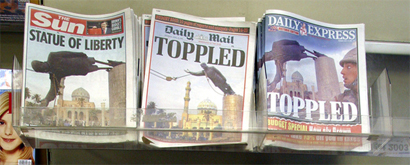The final stream 2 session of the BBC CoJo / Polis Value of Journalism conference; Journalism.co.uk’s session on local media at the grassroots. We’ve got a rather fine panel, if we do say so ourselves: Will Perrin, founder of Talk About Local; David Higgerson, head of multimedia for Trinity Mirror Regionals; Mike Rawlins from Pits ‘n’ Pots; Martin Moore, director of the Media Standards Trust; and Robin Hamman, founder of the St Albans blog and digital director for Edelman.
Will Perrin kicks off, with a whizz through the best of local websites: VentnorBlog, the Sheffieldforum.co.uk, SE1 and SR2 blogs, Perrin’s own King Cross Envonrment and Harringay online. You can find links to these and others on Perrin’s blog roll at this link. Then a look at some new hyperlocal players on the scene, all of which I’ll be investigating later.
Now for a more in-depth look at one in particular; Mike Rawlins’ Pits’n’Pots site based in Stoke-on-Trent.
Why ‘pit’? Because your career was down one, or making ‘pots’… Thus, pits’n’pots was born – with a little red wine and time to help things get going.
In 2008 the founders started to tidy it up and moved platforms: by December 2009, it was up to 1,900 unique users a day. Now it’s getting 2,500 unique users a day.
Why do they do PnP? An interest in local politics; freedom of discussion; a desire to see the city improve; local media were/are not interested in local politics.
The parliamentary maiden speech by new MP Tristam Hunt got a few lines on the local news site, The Sentinel. PnP meanwhile published it in full, with a link to Hansard.
Rawlins talks about a story they published: the BNP had been using images of a Polish spitfire on one of its anti-immigration posters. Shortly after it was picked up by the Mail and the Telegraph – but not attributed or linked to.
Robin Hamman keeps his introduction to his blog in St Albans pretty short. He does however show us how two hyperlocal blogs have bumped the local newspaper down the Google rankings and another rival off page one entirely. Take a look at what he does here: http://stalbansblog.co.uk.
Now the Media Standards Trust’s Martin Moore talks about two areas which need development. Research into local news and how its democratic role has changed over time. He talks about other developments – he is surprised by Jeremy Hunt’s call for local TV, for example.
Secondly, there’s a need for local open data platforms. He say it doesn’t matter who is doing journalism – blogger or mainstream – but they should have the same access to the public data, rather than spending time, money and effort coaxing money out of local authorities.
David Higgerson from Trinity Mirror is talking about how his titles could work more closely with hyperlocal sites. Journalists often see a hyperlocal site as competition, or as a devaluing of journalism – because it they are often run by volunteers. But, he says,the two sides can work together and get over the divide.
There are “some signs” of that working now, he adds. In the north-east there’s a hyperlocal platform with hundreds of bloggers contributing to it, for example. Higgerson outlines some of the opportunities he sees: a greater degree of collaboration: eg. through content swapping.
Local newspapers could give something back to bloggers, perhaps. Could ‘professional’ hyperlocals (e.g ones that are trying to run for profit) sell or syndicate copy to mainstream media? Support-in-kind is another area for development, he says. Can we as journalists offer help and support to bloggers?
But, he says, there’s a basic need for supporting each other: linking to each other. If material has come from a hyperlocal site, there’s no point in masking it as the newspaper’s own content, he adds.
Now onto questions. Will Perrin says media should engage better with local communities and he says the initiatives such as David Higgerson described are very welcomed.
So, are these hyperlocal bloggers journalists? Mike Rawlins and Will Perrin answer with a definite ‘no’. Perrin says journalists are often ranked as the least “trusted” profession, so why on earth would he classify himself as one…?
Higgerson says that journalists are now able to go more out on the patch, enabled by technology. There’s a lot more equipment to allow non-desk based work now.
We talk a bit about the nastier side of blogging, but the panel agrees the successful hyperlocal sites tend to have high standards, and good commenter accountability.
Perrin says Hackney Citizen is a great example of what you can do with print. Their distribution method was to take a pile of magazines to a coffee shop. It’s now due to go monthly, from three monthly editions. “That’s grassroots, bottom-up,” says Perrin.

 “Gradually more power cuts – the future is more certain than you think (…) With 90 per cent certainty I can tell you that tomorrow will be Saturday.”
“Gradually more power cuts – the future is more certain than you think (…) With 90 per cent certainty I can tell you that tomorrow will be Saturday.” After the conference I ran into Bill Thompson, the BBC’s technology columnist. Listen below to hear his views on the future for journalists:
After the conference I ran into Bill Thompson, the BBC’s technology columnist. Listen below to hear his views on the future for journalists: